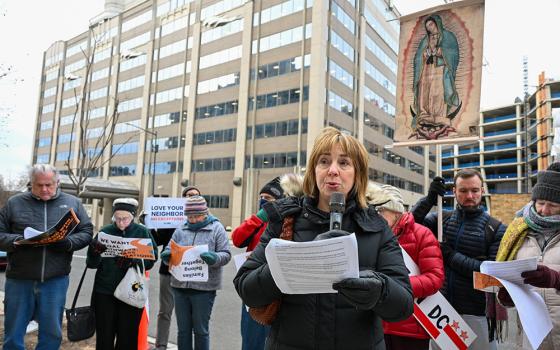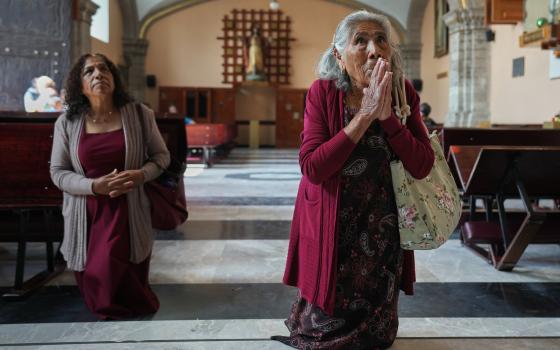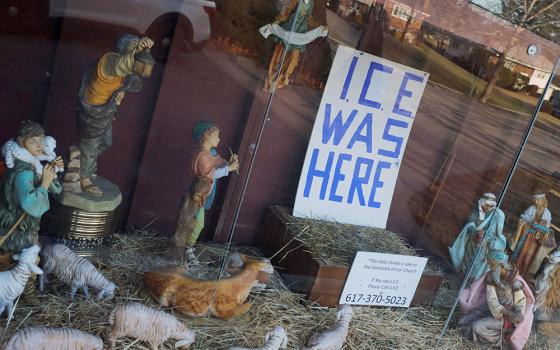
BANGALORE, INDIA -- Thirty Indian scholars and invited guests reflected on the state of moral theology in India at a July seminar here. The national workshop addressed a host of issues: corruption, health care, poverty, politics, interreligious dialogue, the Internet, gender and sexuality, and economics.
Carmelite of Mary Immaculate Fr. Shaji George Kochuthara hosted the workshop, which was titled "Moral Theology in India Today," held July 12-15.
Besides the leading moralists in India today, four other nationally recognized scholars were invited: an economist, a public health leader, a theologian and a philosopher. All were tied to the same common interest, to articulate the basic moral and ethical concerns and challenges facing India today.
Redemptorist Fr. Clement Campos, president of the Association of Moral Theologians of India, opened the conference, inviting participants to ask themselves whether their work sufficiently assisted the needs of everyday India. His words echoed throughout the conference.
Health care was a recurring theme during the four days. Jesuit Fr. Stanislaus Alla presented a paper on the history of health care in India starting with the initiatives of Buddhist monasteries 23 centuries ago and continuing on with Hindus, Muslims and Christians integrating health care into their religious services.
Dr. Mario Vaz and Carmelite of Mary Immaculate Fr. Lucose Chamakala presented the enormous challenges facing health care in India today: from a universal lack of standard ethical oversight, to the rising ranks of physicians looking for more economically attractive positions in highly specialized services coupled with the daunting needs of the emerging geriatric population.
These papers were followed by an even more sobering one on female feticide by Jesuit Fr. John Karuvelil. Though sex-selective prenatal determination tests are banned in India, there are more than 40,000 ultrasound clinics. An estimated 557,000 female fetuses are aborted each year. Karuvelil explained that the abortions highlight how poorly women fare in India, which ranks 113th out of 130 on gender parity, according to the World Economic Forum. At one point, after remarking that India has prohibited the practice of dowry, passing laws in 1961, 1983 and 1985, he explained how dowry, still a common practice, only exacerbates the poor status of women.
 Karuvelil's paper concretized the claims of an earlier one by Congregation of the Mother of Carmel Sr. Vimala Chenginimattam. Calling for a "gender-sensitive church," she spoke about the challenges women face in bringing about that sensitivity. While noting that some "so-called women representatives in the parishes or dioceses have no gender consciousness and are like dolls in the hands of authority," those who do speak up "are labeled as antichurch and often marginalized or silenced." She concluded, "Gender equity can be reached only when men think that gender inequality is their crisis too."
Karuvelil's paper concretized the claims of an earlier one by Congregation of the Mother of Carmel Sr. Vimala Chenginimattam. Calling for a "gender-sensitive church," she spoke about the challenges women face in bringing about that sensitivity. While noting that some "so-called women representatives in the parishes or dioceses have no gender consciousness and are like dolls in the hands of authority," those who do speak up "are labeled as antichurch and often marginalized or silenced." She concluded, "Gender equity can be reached only when men think that gender inequality is their crisis too."
Other papers on gender and sexuality were also discussed at the conference. Kochuthara presented a variety of reports on contemporary India that manifested "a more sexually carnivorous urban Indian willing to break taboos and boundaries." One participant objected that this was no more than the influence of "Western values," but Kochuthara insisted that these were not Westerners who were revolting against sexual standards but Indians. He concluded by arguing for a sexual ethics for the "actual lived experiences of the Indian people."
Against the disparities of wealth and class, participants raised concerns for the common good and the civil society of India. The secretary of the Office for Justice, Peace and Development for the Catholic Bishops' Conference of India, Fr. Charles Irudayam, a priest of the diocese of Sivagangai, Tamil Nadu, spoke eloquently of how the Catholic understanding of justice provides a "substantive vision" of the goods that society needs to guarantee the type of equality espoused by the Indian Constitution.
Arguably the most significant paper was by Jesuit Fr. George Kodithottam, who proposed a Gandhian concept of civil society that would campaign to overcome the representational deficit of Indian democracy. Kodithottam described civil society as that independent space where the needs, vision and goals of a people are articulated and pursued. He concluded, "An inclusive civil society grounded on justice is required to ensure ethics in politics."
In a genuine validation of these claims, Jesuit Fr. John Chathanatt presented a book that he edited, Silent Waves: The Contribution of the Catholic Church to Nation Building (Claretian Publications, 2012). He explained that the Indian bishops' conference mandated Caritas India to do this study of Catholic institutional services in the country.
India's 17 million Catholics constitute less than 1.5 percent of India's population of more than 1.2 billion people. But Silent Waves demonstrates that Catholic health care, with more than 5,500 health care facilities, many in rural areas, clearly outranks any religiously dedicated health services. The work of women religious, who count more than 600 physicians among their sisters, stands out throughout the study. By collaborating with the government, their facilities have managed to eradicate malaria in seven states and tuberculosis in 18 states.
On education, the report showed that Catholic schools educate more girls than boys; that one in five students are ethnic tribals or dalits, formerly known as "untouchables"; that unlike hospitals only 10 percent of the schools are state-funded; and that half of all Catholic schools are in rural areas.
Besides dealing with applied, social, medical and sexual ethics, the participants also presented papers dealing with basic ethical concepts. There was a very fine paper on imagination and ethics by Mathew Illathuparampil, a professor at St. Joseph Pontifical Seminary in Kerala, and Holy Spirit Sr. Kochuthresia Puliappallil spoke on virtue ethics and its resources for the church's liturgical life.
Fr. Scaria Kanniyakonil, secretary to the Association of Moral Theologians of India, provided a final, hopeful word. He highlighted how virtue ethics had raised greater consciousness within India about responding to social challenges and how those conversations led to the articulation of more enforceable and just laws promoting the common good.
The seminar was held at Dharmaram Vidya Kshetram, the Pontifical Athenaeum of Philosophy, Theology and Canon Law where some 750 students pursue graduate degrees. The school is staffed by the Carmelites of Mary Immaculate, who are part of the Syro-Malabar Rite. At the Bangalore campus are more than 300 members of the order who also staff Bangalore's Christ University, with its 13,000 students.
The conference's host, Kochuthara, has become a major player in contemporary Indian theology. A member of the Asian regional committee of Catholic Theological Ethics in the World Church, he is the editor of the quarterly Asian Horizons.
The Dharmaram will host an international conference in January celebrating the 50th anniversary of Vatican II.
[Jesuit Fr. James F. Keenan is the Founders Professor of Theology at Boston College and the founder and co-chair of Catholic Theological Ethics in the World Church.]



